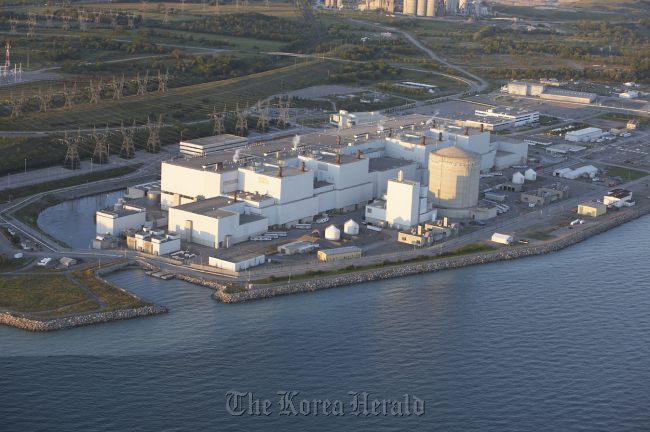‘Korea needs to benchmark Canada, U.S. for nuclear safety’
By Chung Joo-wonPublished : Sept. 16, 2012 - 19:57
Transparency in decision-making process is vital to win residents’ support
On March 11, 2011, the world witnessed how an ill-managed nuclear plant can affect people’s daily lives. The infamous Fukushima nuclear disaster has become a mark of shame for the entire nuclear power industry ever since.
Experts agree that one of the toughest items on the agenda for pro-nuclear energy countries like Korea is safety.
Nevertheless, the Korean Ministry of Knowledge Economy and nuclear-related institutions under the ministry have confidence in safely running the new and refurbished nuclear plants.
Government officials agreed that the safety issues and protests against relicensing of past-design-life nuclear plants will bring down the global nuclear power market for a while.
They claimed, however, that a number of countries share the view that “there is no source of energy to replace nuclear energy, eventually calling for a renaissance in nuke power.”
Canada, the world’s fifth-largest producer of uranium, is among the countries with the highest power consumption. About 15 percent of its power comes from nuclear energy.
Officials from the Canada Nuclear Safety Commission said last week that transparency and public intervention in decision making were key for successful communication.
On March 11, 2011, the world witnessed how an ill-managed nuclear plant can affect people’s daily lives. The infamous Fukushima nuclear disaster has become a mark of shame for the entire nuclear power industry ever since.
Experts agree that one of the toughest items on the agenda for pro-nuclear energy countries like Korea is safety.
Nevertheless, the Korean Ministry of Knowledge Economy and nuclear-related institutions under the ministry have confidence in safely running the new and refurbished nuclear plants.
Government officials agreed that the safety issues and protests against relicensing of past-design-life nuclear plants will bring down the global nuclear power market for a while.
They claimed, however, that a number of countries share the view that “there is no source of energy to replace nuclear energy, eventually calling for a renaissance in nuke power.”
Canada, the world’s fifth-largest producer of uranium, is among the countries with the highest power consumption. About 15 percent of its power comes from nuclear energy.
Officials from the Canada Nuclear Safety Commission said last week that transparency and public intervention in decision making were key for successful communication.

The CNSC’s status as a quasi-judicial independent tribunal whose decisions can be reviewed only by the Federal Court also contributes to the commission’s transparency, adding to public expectation that the organization’s licensing processes stay detached from state and corporate interests.
One of the most distinguished features of Canadian nuclear safety regulation is that nuclear power companies must have their license renewed by CNSC every five years, regardless of the design-life, or designated life span, of their plant facilities.
The 65-year-old regulatory committee said that it provides public, webcast committee hearings on matters related to licensing major nuclear facilities. These hearings give affected parties and the public an opportunity to intervene and voice their opinions before the commission tribunal, building up communities’ trust for CNSC.
A fervent three-week public hearing for licensing the new units of Darlington nuclear power plant in Canada was held in August 2011, six days a week. The license was issued in August 2012.
Another public license amendment hearing was held in early 2012 to authorize construction of the waste management facility and remediation of contaminated sites in the municipality of Port Hope and Clarington Area in Ontario, allowing advocates and protestors to express their thoughts online.
The United States Nuclear Regulatory Commission, or U.S. NRC, a U.S. counterpart of the CNSC, said that about 20 percent of U.S. electricity came from nuclear energy.
U.S. nuclear plants can apply for a first license of 40 years at the most. After the first 20 years of operation, they can apply for a license renewal up to 20 years at a time, which takes 22 months to five years of USNRC assessment.
In legal terms, the companies can reapply as many times as they want, but no company has applied for a second license renewal. Such a case would require much more thorough assessment, the USNRC said.
The commission has coordinators who help the commission to stay in friendly terms with the local community.
U.S. nuclear plants, which are generally privatized, have advanced insurance coverage for nuclear accidents. Three out of four Canadian power generating companies are state-run, and all Korean power plants are state-run.
The Price-Anderson Act requires all operators to purchase insurance in the commercial market worth several million U.S. dollars. Considering secondary and additional insurance plans, the value worth about $12 billion, the U.S. NRC said.
There are politically independent hearing processes for licensing, but the localities are not in a voting position, the commission said.
Cheri Collins, general manager of both external alliances and Vogtle Nuclear Power Plant in Georgia, said that nuclear energy is competitive against other fuels because it is stable in price ― unlike natural gas and coal -― and is much more available than hydro energy.
Shale gas is still cheap, but Collins said the price was likely to rise because the profit margins were too low.
Plant Vogtle was built to withstand physical impact that is 20 percent stronger than the strongest earthquake that has happened in the past 300 years in the area, ensuring the localities of the safety of its nuclear facilities.
By Chung Joo-won (joowonc@heraldcorp.com)



![[AtoZ into Korean mind] Humor in Korea: Navigating the line between what's funny and not](http://res.heraldm.com/phpwas/restmb_idxmake.php?idx=644&simg=/content/image/2024/04/22/20240422050642_0.jpg&u=)


![[Herald Interview] Why Toss invited hackers to penetrate its system](http://res.heraldm.com/phpwas/restmb_idxmake.php?idx=644&simg=/content/image/2024/04/22/20240422050569_0.jpg&u=20240422150649)
![[Graphic News] 77% of young Koreans still financially dependent](http://res.heraldm.com/phpwas/restmb_idxmake.php?idx=644&simg=/content/image/2024/04/22/20240422050762_0.gif&u=)

![[Exclusive] Korean military set to ban iPhones over 'security' concerns](http://res.heraldm.com/phpwas/restmb_idxmake.php?idx=644&simg=/content/image/2024/04/23/20240423050599_0.jpg&u=20240423171347)





![[Exclusive] Korean military to ban iPhones over security issues](http://res.heraldm.com/phpwas/restmb_idxmake.php?idx=652&simg=/content/image/2024/04/23/20240423050599_0.jpg&u=20240423171347)



![[Today’s K-pop] Ateez confirms US tour details](http://res.heraldm.com/phpwas/restmb_idxmake.php?idx=642&simg=/content/image/2024/04/23/20240423050700_0.jpg&u=)